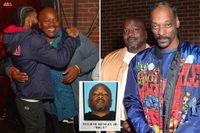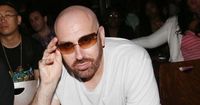Eugene Henley Jr., known as "Big U," a prominent figure in the hip-hop industry, was arrested along with 17 other members of the notorious Rollin' 60s Neighborhood Crips gang, facing a range of serious federal charges including murder, human trafficking, robbery, and extortion. The indictment, which was announced by the U.S. Attorney's Office on March 19, 2025, uncovers a shocking narrative of how Henley purportedly ran a criminal enterprise known as the "Big U Enterprise."
Federal prosecutors allege that Henley, 58, has been operating this organization akin to a mafia, holding power and instilling fear in Los Angeles for over a decade. U.S. Attorney Joseph T. McNally remarked, "The facts alleged in the complaint paint a very different picture. It is one of a murderer, a thief, a liar and a cheat, and the criminals that enabled him." Being connected to the street gang, Henley has used his prominent status in the music industry to further his criminal activities while maintaining a public persona as an anti-gang activist.
Among the grave accusations against Henley is the alleged murder of aspiring rapper Rayshawn Williams, who was signed to his record label, Uneek Music. It is believed that Williams was killed after recording a diss track about Henley in 2021; his body was later discovered dumped in a remote area of Nevada. Prosecutors argue that Henley's influence allowed him to intimidate not only individuals within the music community but also businesses and potential high-profile visitors to Los Angeles, requiring them to "check in" with him to avoid conflict.
Henley also faces accusations of embezzling funds from his charity, Developing Options, which was intended to aid anti-gang initiatives. Notably, he allegedly diverted donations from celebrities and NBA stars, including Draymond Green and Shaquille O’Neal, into his own pockets. This charity, while publicly promoting anti-gang solutions, reportedly served as a front to continue Henley’s criminal activities. FBI Special Agent in Charge Tyler Hatcher said, "Henley allegedly duped the County of Los Angeles by running a charitable organization that promoted anti-gang solutions while continuing criminal activity that was directly contrary to his charity."
The indictment also cites that Henley sought financial relief under fraudulent pretenses during the COVID-19 pandemic for Uneek Music, which is emblematic of the enterprise’s breadth of deceit. Henley's criminal past includes a 13-year prison sentence for robbery, serving time before trying to rehabilitate his image through music and charity work.
In a docuseries he helped produce, "Hip Hop Uncovered," Henley openly recounted his rise within the Crips in the 1980s and his efforts to escape that life after his release from prison in 2004. Wiz Khalifa, a notable rapper, has praised Henley's influence, calling him the "godfather" of the rap game, while asserting that he plays a crucial role in guiding many artists.
The repercussions of Henley’s indictment reverberate through the hip-hop community. Major online platforms, including VladTV, which featured Henley in past interviews, reacted to the charges. DJ Vlad commented, "I think in this particular case, Vlad TV doesn't have anything to do with this case," distancing himself and the show from the criminal allegations involving Henley.
Henley has consistently denied the allegations against him, describing them as outrageous in a social media post where he referred to the charges as "bull crap" and "straight trash." He claims that he is being targeted due to his skin color and the positive work he purportedly does for the community.
Following the initial shock of Henley's arrest, other media figures, including Adam22 of No Jumper, also sought to clarify their positions, implying that their platforms do not play a role in the unfolding legal troubles. Adam22 stated, "I'm not seeing anything that says anything about stuff he did in the last two years since he's been f***ing with us," asserting that they are not responsible for the actions of individuals residing in the criminal sphere outside of their professional engagements.
The situation underscores how intertwined the worlds of crime and entertainment can be, particularly in a vibrant city like Los Angeles that has seen the rise of hip-hop culture. Eugene Henley Jr.'s story starts with a promising foray into the music business, yet his alleged actions paint a troubling portrait of the darker underbelly of fame, raising questions about accountability and the impact of past affiliations.
If convicted, Henley could face a maximum sentence of life in federal prison, a stark reminder of the consequences that come with a life of crime. The case against Henley and his associates proceeds with the legal processes typical of federal racketeering cases, where substantial evidence concerning their alleged operations will be reviewed.
As this story develops, the world watches, intrigued by layers of artistry overshadowed by crime, revealing not only the complexity of Henley’s life but also the challenges of separating the personas crafted in the public eye from the reality behind closed doors.





